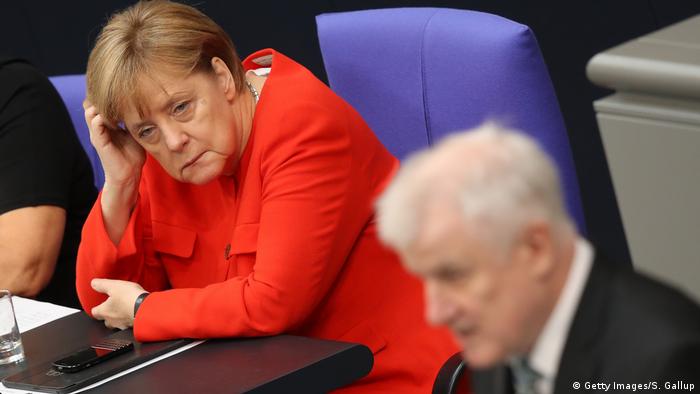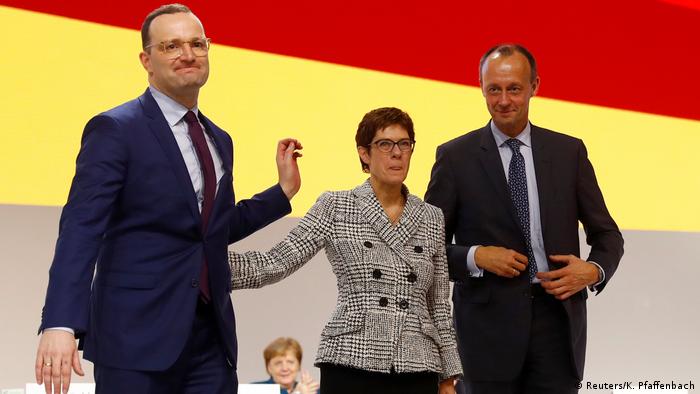Some of them hoped that Germany and Angela Merkel could act as a kind of counterpoint to US President Donald Trump. That was an Illusion, says DW correspondent Jefferson Chase. He looks back on twelve eventful months.

In my memory the most telling picture of last year is a photo of Angela Merkel, Horst Seehofer, on the balcony of the Chancellery. The Chancellor returns to her defiant Minister of the interior, the back and walks away annoyed – as if Seehofer were a dog, you can distribute just the Garbage in your kitchen would have caught. The Wind has messed Merkel’s normally perfectly fitting hairstyle. The Chancellor looks unhappy, tired and old.
At that time, Merkel has every reason to be a little disheveled. Merkel’s summer was marked by seemingly endless negotiations with CSU interior Minister Seehofer – about the rejection of certain asylum seekers at the border. A topic that the government almost brought to Collapse and only a poor compromise just could not yet be solved. The photo was for me, I have observed Merkel’s long, strange. Merkel, the stress-resistant Chancellor was always par excellence. A five-hour question-and-answer in front of a Bundestag Committee of inquiry into the phone-spying affair? Not a Problem for Merkel. You didn’t even need a toilet break.
Merkel wanted to no breaks
But that was before 2018. The image of a weakened Merkel, who is fleeing from the menace Seehofer, can be easily as a metaphor for the German Republic to transfer. According to a latest report in the “New Yorker”magazine, Merkel in 2017, decided to go for a fourth Chancellor candidacy in part from the Conviction that the world needs a rational counter-weight to Trump. But in 2018, the moderate Merkel and the embodied political System demonstrated under this load, the first serious cracks.

Martin Schulz and the SPD experienced in 2018, a dramatic crash
Ironically, the Chancellor, who are looking for compromise and the dirty political everyday squabbles, nothing for the breaks in the System, usually could. The year began for them in almost the usual manner, with negotiations on a third Grand coalition of the CDU and the SPD. Just the Partner, the SPD threatened this time to break away. Like many observers, I was also surprised by the constant Manoeuvring, the Martin Schulz cost the party the presidency. In contrast, Juso-chief Kevin Kühnert made a positive impression on me. The then 28-year-old Student may no Tie and no expensive suits, but he knew exactly what he wanted, and what is not. He expressed himself clearly and consistently.
Earplugs for the SPD
This is not necessarily all of the SPD leaders say. Party General Secretary Lars Klingbeil fact to me almost sorry, when I asked him at a public discussion of the disastrous election campaign of 2017, if the Problem of the SPD is simply that there is hardly an industrial working class in Germany. What could say to the poor man? Another scene has me led to the decline of the SPD in a particularly succinct. In front of the hall in Wiesbaden, Germany, in the SPD-party Congress which, according to strong, Andrea Nahles chose somewhat reluctantly, to the new Chairman, distributed a couple of jokers from the young Union earplugs. Also SPD delegates have taken her. Of this party the fourth-Merkel-government.
Political suicide in Slow Motion
The biggest Problem for Merkel came from within its own ranks, because Seehofer not to was far from the only Conservative who tried the migration policy of the government is undermined. This basic disagreement broke out at the ugliest on the streets of Chemnitz, is a social break point anywhere in the country, especially in the East. In August I went to Dresden. There are about 1000 AfD and Pegida threw-supporters of the Chancellor during her visit to the Saxon Parliament of slogans of hate. It was not to see how much populist Aggression, Merkel realized the way short of your saloon in the building actually.

Conservative rivals from the Union, and Horst Seehofer made to create German Chancellor Angela Merkel
The voters punished the conservative squabbling over immigration policy. And the forced the Chancellor to an unexpected maneuver. After poor election results in Bavaria and Hesse, rang Merkel even to the beginning of the end of your political life by announcing that the party chair and not to stand again as Chancellor. The conservative self-disassembly was less spectacular than that of the SPD. A kind of self-killing, which was seen in January, no one ahead, she was still.
What small country?
At the end of the GAU. The bickering Merkel-IV-government survived the difficult year, and in December, the Chancellor could take some comfort in that your favourite Kramp-Karrenbauer, Annegret the CDU took over the party presidency. But the Nimbus of a lack of alternatives has come for Merkel and her centrism for ever lost. If the polls don’t lie, and establish the Greens as the second political force, the AfD may make the SPD’s place in dispute. The political landscape is formed. The current Grand coalition will probably be the last. Many believe: The Alliance of the future is black-green. A soft spot for this kind of coalition is said to Merkel often. Will run but no more.

New party boss Annegret Kramp-Karrenbauer: The CDU rates is divided into a moderate and a conservative wing
Beginning in 2018, a lot of people were hoping that Merkel and Germany could compensate for on the international stage, the bigoted nationalism of the Trump government somehow. That was naive. As the “New York” concludes correctly: “Angela Merkel is the leader of the free world and it will not be”. It is not even sure that it will lead to the end of 2019 Germany.